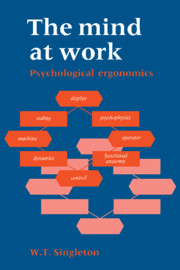2 - SKILL AND TRAINING
Published online by Cambridge University Press: 22 September 2009
Summary
Concepts
Developmental aspects
Most laboratory and field studies of human behaviour involve taking a situational snap-shot at a given time in a given place. It is easy to overlook the continuously changing nature both of people and of work situations.
When the skilled manager encounters what, on the face of it, is an intolerable set of work practices, attitudes and performance he does not necessarily take drastic action, he identifies the natural processes of change and accelerates them. In a remarkably short time changes in procedures, products and workload, promotions, resignations, retirements and so on can transform any situation.
The changes within an individual are even more inexorably continuous. Again it is easy to develop the illusion that a worker is a constant factor in a changing situation particularly for a person in the middle period of working life. This was encouraged by the traditional view of a skilled man as one who learned his trade by the age of 21 and thereafter practised it for more than forty years until he retired at 65. This was never the case and in the current working world it is even less so because of developing technology which has its impact on almost all jobs and also on the social context of work. For example, because of employment levels there is currently an emphasis on earlier retirement from and later entry into the working world.
- Type
- Chapter
- Information
- The Mind at Work , pp. 80 - 134Publisher: Cambridge University PressPrint publication year: 1989



